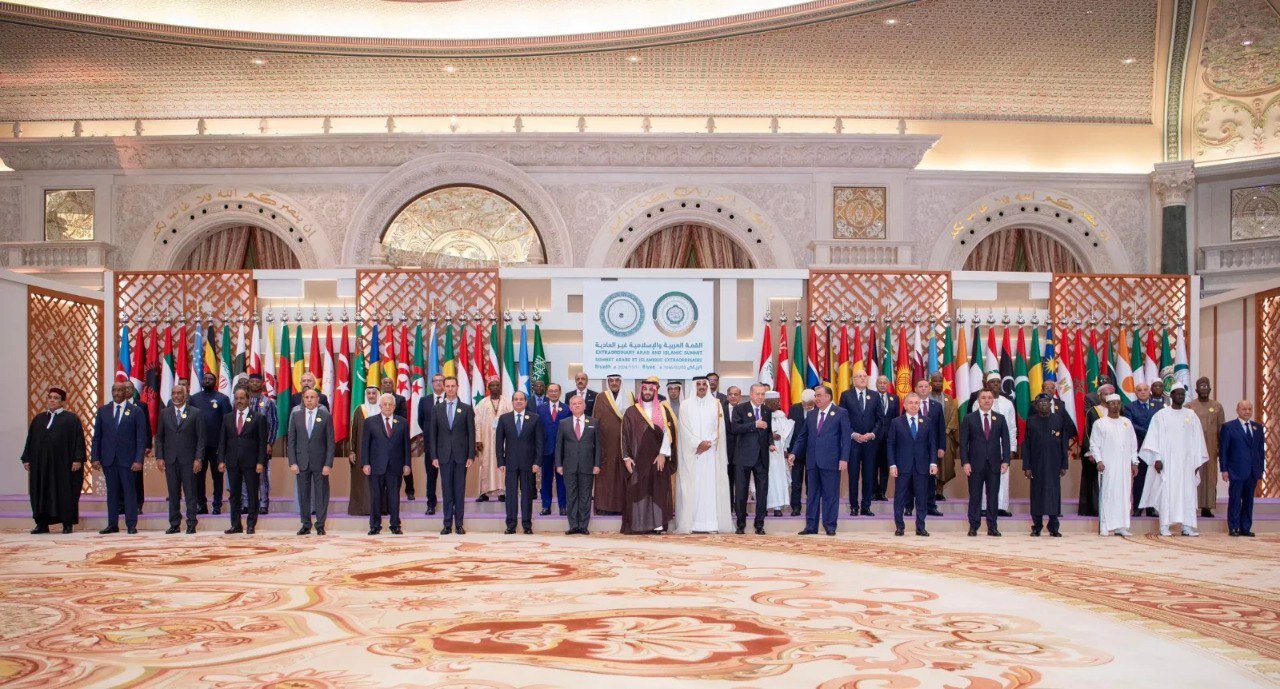Seeking Peace in Riyadh, bloodbath in Gaza and Lebanon
The OIC and Arab League summit reaffirms commitment to Palestinian statehood amid Israel’s ongoing genocide

TEHRAN – In a significant gathering in Riyadh on Monday, the participants of the extraordinary Organization of Islamic Cooperation (OIC) and the Arab League summit, which included leaders from over 50 Arab and Islamic nations, issued a final statement emphasizing the centrality of the Palestinian cause.
The statement reiterated strong support for the Palestinian people's legitimate rights, particularly their right to freedom and to establish an independent state with full sovereignty. The participants firmly declared that al-Quds will remain the eternal capital of Palestine.
This came amid heightened regional tensions, as the Zionist regime’s Foreign Minister Gideon Saar rejected the establishment of a Palestinian state as a "realistic" goal, stating that such a solution is no longer feasible in light of the ongoing war in Gaza. Saar’s remarks followed continuing Israeli military actions that have sparked widespread international criticism and condemnation.
At the summit, Saudi Crown Prince Mohammed bin Salman condemned the "massacre" perpetrated by Israel against the Palestinian and Lebanese populations. He called on Israel to cease its aggression immediately.
In his address to the joint meeting of the Arab League and the OIC, Crown Prince Salman expressed that Israel's actions are a gross violation of international law and peace efforts.
Ahmed Aboul Gheit, the Secretary-General of the Arab League, joined the Saudi Crown Prince in condemning Israel's relentless attacks, emphasizing that Israel’s actions against the Palestinian people were undermining all efforts for lasting peace. "Words cannot express the plight of the Palestinian people," Aboul Gheit said, stressing that only through justice can lasting peace be achieved.
In his address to the summit, Palestinian President Mahmoud Abbas called on Arab and Islamic nations to stand in solidarity with Palestine. He urged for the immediate implementation of UN resolutions to halt Israeli aggression in Gaza and to ensure the delivery of humanitarian aid to the besieged territory.
The Palestinian resistance movement Hamas, ahead of the summit, had called for the formation of a unified Arab and Islamic coalition to pressure Israel and its supporters to end the ongoing atrocities in Gaza and Lebanon. The summit further reinforced this call for collective action.
Also addressing the summit, Syria's President Bashar al-Assad, compared Israel's actions to Nazi-like atrocities.
He condemned the continued support Israel receives from Western countries, which he insisted fuels Israel's violence. Reflecting on previous peace efforts, al-Assad criticized the failure of initiatives such as the Arab Peace Initiative and the Madrid peace talks, stating that these efforts have proven ineffective in halting Israeli violence. He called for a fundamental shift in approach, urging that actions, not just words, be taken to secure Palestinian rights and bring an end to Israeli crimes.
Recep Tayyip Erdogan, Turkey’s President, also addressed the summit, warning that Israel aims to destroy Palestinian existence and ultimately annex all Palestinian territories with its brutal attacks, which have killed at least 44,000 Palestinians since last year.
“Israel’s relentless offensive on the Gaza Strip and increasing crackdown on Palestinians in the occupied West Bank are proof this is where the situation is headed. We must encourage as many nations as possible to join South Africa’s case against Israel at the International Court of Justice," Erdogan told the Arab and Muslim states.
Iranian President Masoud Pezeshkian, unable to attend the summit due to pressing executive matters, expressed his country's full support through a phone conversation with Saudi Crown Prince Salman.
Iran’s First Vice President Mohammad Reza Aref attended the summit on behalf of Iran and emphasized Tehran’s commitment to collective efforts to stop Israeli aggression and restore justice in the region.
Aref, in line with Pezeshkian’s message, reiterated the need for decisive, collective action to end Israeli crimes during his address.
He proposed that a referendum be held among Palestinians as part of Iran’s strategy to restore their right to self-determination. Aref emphasized that real steps must be taken to end the bloodshed and fulfill the legitimate aspirations of the Palestinian people.
The summit’s final statement also highlighted the urgent need for international action, calling on the international community to exert pressure on Israel to stop its deadly hostilities in Gaza and Lebanon, protect civilians, and ensure humanitarian aid access to both Palestinian and Lebanese territories.
The summit, which was held at the suggestion of the Islamic Republic of Iran, and following diplomatic efforts and multiple contacts by Iranian Foreign Minister Abbas Araghchi, underscored the necessity of a united stance among Arab and Islamic nations to confront Israeli aggression and work toward lasting peace and stability in the region.
This extraordinary summit follows a similar gathering a year ago, during which leaders also condemned Israeli actions in Gaza as “barbaric.” The ongoing escalation of violence in Gaza and Lebanon continues to prompt urgent action from regional powers, with many leaders reiterating their commitment to securing peace and justice for the Palestinian people.
Since October 7, Israel has launched continuous air and ground strikes in Gaza, targeting hospitals, homes, academic centers, and religious sites. Israel’s military has also escalated its offensive against Lebanon, with intensified airstrikes on Hezbollah forces since September 23. The Lebanese Health Ministry reports 3,189 deaths and 14,078 injuries since the conflict’s start in October 2023. On Sunday alone, 24 people were killed in Israeli strikes on southern and eastern Lebanon, according to the National News Agency.
Leave a Comment